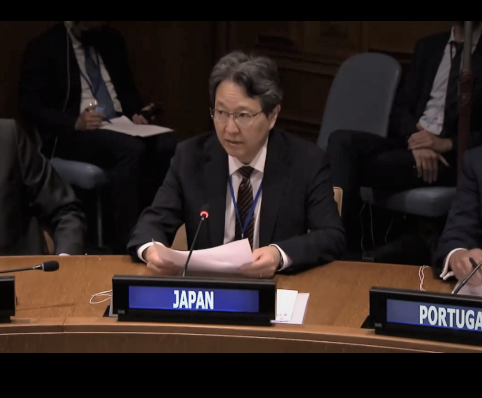HLPF SDG6(水関係)特別イベントにおける木村大使ステートメント
令和4年7月13日
 |
 |
(As delivered)
Thank you for organizing this important event.
In April of this year, Japan hosted the 4th Asia-Pacific Water Summit. Approximately 5,500 participants from 30 countries, including 18 Heads of State and Government, discussed various water-related issues.
Leaders of the region reaffirmed the importance of water as they deal with the widespread disruptions of the COVID-19 pandemic and increasingly severe and interconnected disasters aggravated by climate change.
They adopted the "Kumamoto Declaration," which manifests their determination to accelerate efforts to realize the transformation towards a quality-oriented society from the perspective of resilience, sustainability, and inclusiveness, stressing the importance of improving governance, closing financial gaps, and engaging the science and technology community.
At the Summit, Prime Minister Kishida announced the "Kumamoto Initiative for Water,” which includes Japan’s commitment to provide developing countries with financial assistance worth approximately 500 billion Japanese yen over the next five years and to contribute to solving water-related social issues through the development of quality infrastructure utilizing advanced technologies.
Japan is promoting digitization and technological development to improve the use of its dams and other infrastructure in order to address climate change. Specifically, Japan is strengthening data sharing among its 1,500 dams and developing technology to optimize dam inflow forecasts and operations using Artificial Intelligence to maximize the effects of flood control. In addition to dams, Japan is also making efforts to optimize the operation of infrastructure, including sewage systems and agricultural water supply facilities.
Based on the wealth of know-how and technologies that Japan has cultivated, we will promote the development of quality infrastructure utilizing hybrid technologies that contribute to both climate change adaptation measures, such as improving flood control and water utilization capacity, and mitigation measures, such as increasing hydroelectric energy. In cooperation and collaboration with other countries, regions, and international organizations, Japan will contribute to solving water-related issues around the world.
We believe these outputs are ‘inclusive, action-oriented, and cross-sectoral,’ as agreed in the Conference’s Vision Statement, and will contribute to the UN Water Conference next March.
Lastly, we would like to express our gratitude to the Netherlands and Tajikistan for hosting the UN 2023 Water Conference. Japan would like to share the necessity of responding to climate change and water-related disasters, we look forward to having deep discussions on addressing these issues at the conference.
I thank you.
In April of this year, Japan hosted the 4th Asia-Pacific Water Summit. Approximately 5,500 participants from 30 countries, including 18 Heads of State and Government, discussed various water-related issues.
Leaders of the region reaffirmed the importance of water as they deal with the widespread disruptions of the COVID-19 pandemic and increasingly severe and interconnected disasters aggravated by climate change.
They adopted the "Kumamoto Declaration," which manifests their determination to accelerate efforts to realize the transformation towards a quality-oriented society from the perspective of resilience, sustainability, and inclusiveness, stressing the importance of improving governance, closing financial gaps, and engaging the science and technology community.
At the Summit, Prime Minister Kishida announced the "Kumamoto Initiative for Water,” which includes Japan’s commitment to provide developing countries with financial assistance worth approximately 500 billion Japanese yen over the next five years and to contribute to solving water-related social issues through the development of quality infrastructure utilizing advanced technologies.
Japan is promoting digitization and technological development to improve the use of its dams and other infrastructure in order to address climate change. Specifically, Japan is strengthening data sharing among its 1,500 dams and developing technology to optimize dam inflow forecasts and operations using Artificial Intelligence to maximize the effects of flood control. In addition to dams, Japan is also making efforts to optimize the operation of infrastructure, including sewage systems and agricultural water supply facilities.
Based on the wealth of know-how and technologies that Japan has cultivated, we will promote the development of quality infrastructure utilizing hybrid technologies that contribute to both climate change adaptation measures, such as improving flood control and water utilization capacity, and mitigation measures, such as increasing hydroelectric energy. In cooperation and collaboration with other countries, regions, and international organizations, Japan will contribute to solving water-related issues around the world.
We believe these outputs are ‘inclusive, action-oriented, and cross-sectoral,’ as agreed in the Conference’s Vision Statement, and will contribute to the UN Water Conference next March.
Lastly, we would like to express our gratitude to the Netherlands and Tajikistan for hosting the UN 2023 Water Conference. Japan would like to share the necessity of responding to climate change and water-related disasters, we look forward to having deep discussions on addressing these issues at the conference.
I thank you.
